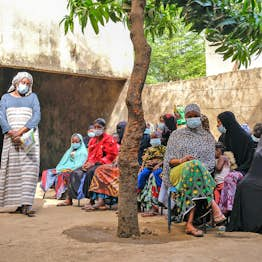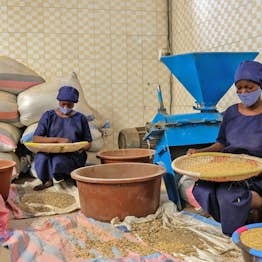Introduction
In Mali, the implementation of the programmes in the third Indicative Cooperation Programme (ICP III, 2015-2020) which focuses on rural development, training and integration into the job market, and inclusive governance and decentralisation, has continued in a satisfactory way despite the growing instability of the security context, the COVID-19 health crisis and the institutional crisis experienced by the country in 2020.
Read more
In particular, the hydro-agricultural development work covering 510 hectares in the West San plain (Ségou region) has progressed well, and the plots should be ready for commissioning in 2021. These works should make it possible to increase the available agricultural land of more than 1,900 farmers and facilitate access to food and nutritional security for nearly 9,500 beneficiaries.
With the support of Luxembourg’s Development Cooperation, 174 apprentices (of 180 in apprenticeships) were certified by the Regional Department of Gao and Kidal following training received from master craftsmen. Regional mechanisms in place provide for the training and equipping of these master craftsmen to develop their skills and increase the chances of success for the apprentices, who are also provided with a small amount of equipment in line with the various apprenticeship fields (electricity in construction, joinery, food processing, market gardening, animal fattening, fish farming and repairing motor pumps). In the Ségou region, the regional council has also delivered initial training courses providing qualifications to 1,060 learners and has completed the apprenticeship training of 2,991 apprentices (with a success rate of 94.56%) and has granted 590 loans to individuals to start their first business.
Through support from Luxembourg, it has also been possible to consolidate the achievements of the UN Women programme to improve women’s access to the means of production to build agriculture that is resilient to climate change. Among other things, in 2020 the programme provided access for 2,905 women to 87 hectares of land and boosted the sustainable agricultural practices skills of 10,764 beneficiaries.
In addition, nine Luxembourgish NGOs (Caritas, the Luxembourg Red Cross, ECPAT, Fondation Partage, Fondation Raoul Follereau, Handicap International, SOS Villages d’Enfants, SOS Faim and SOS Sahel) have run projects in 2020 in Mali in the sectors of health, water and sanitation, education and vocational training, rural and agricultural development, emergency aid and the elimination of violence against women.
Political developments, however, prevented the signing of the next ICP, which had been intended to cover the 2021 – 2025 period. To address these challenges, a development cooperation transition strategy with Mali has been drafted, to direct development cooperation relations during the transition phase.
Priority areas of intervention
- Zero hunger
- Quality education
- Decent work and economic growth
- Peace, justice and strong institutions
Development of PDA
To support Mali to combat COVID-19, Luxembourg contributed EUR 1,500,000 to the operations of the World Food Programme (WFP) and the United Nations Children’s Fund (UNICEF) to boost their efforts to help vulnerable populations. Luxembourg also supported the work of civil society organisations in the health sector through a contribution of EUR 700,000 to the European Commission’s Directorate-General for European Civil Protection and Humanitarian Aid Operations (ECHO).
Reference data
- Population (MIO): 20.3
- GNI (per resident): USD 2350
- Human Development Index (HDI): 184/189
- Life expectancy: 59.3
- Indicative Cooperation Programme: 2015-2020
Key achievements 2020
- Development of a strategy for the transition from development cooperation with Mali (2021 – 2022)
- Hydro-agricultural development works covering 510 hectares in the West San plain (Ségou region), 70% complete
- Boosting of the sustainable agricultural practices skills of more than 10,000 individuals (UN Women

